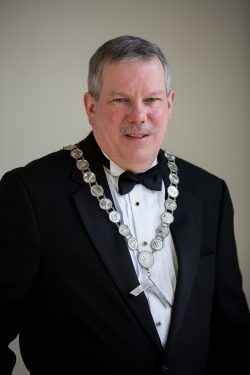From the East – January 2018
 Dear Brothers,
Dear Brothers,
In writing my first message from the East, I cannot help but think of the night when I was first made a Mason. What most impressed me that night, was the ritual and the time and effort that must have been exerted by the members of the lodge. To this day, I can still recall the names of the Brothers, who gave the lectures during my degrees. Experiencing the degrees from the sidelines also greatly impressed me. I remember thinking then that this was something I wanted to do, which naturally led me to join the officer line.
In learning and further appreciating ritual over the past several years, what has helped me with its memorization, has been developing a deeper understanding of what is actually being conveyed to the candidates and the brothers in attendance. This is especially true with the charges, which in various forms, are not only given at the end of each degree, but in some cases during the degree. A charge is also given at the end of every meeting, whether it be a regular or emergent communication, with the Master standing on the level with the Brethren. When you carefully read the charges, they lay the framework as to how we, as Masons, should conduct ourselves and act throughout our lives. When coupled with our obligations, a solid foundation is laid for a moral and upright life. In other words, “making good men better”.
Various forms of charges can be traced back hundreds, if not thousands of years. The first written charges, that we know of, are contained within the Halliwell Manuscript, also known as the Regius Manuscript or Poem. This manuscript is dated to the 1300s and contains over 700 lines of rhymed verse. Per various sources, the original poem is written in Middle English and it begins by describing how Euclid “counterfeited geometry” and called it masonry, for the employment of the children of nobility in Ancient Egypt. It describes the spread of masonry to various lands and was brought to England during the reign of King Athelstan (924 -939). In addition, it describes how Athelstan and the nobility forged 15 articles and 15 points for their rule. It is followed by 15 articles for the master concerning both moral behavior and the operation of work on a building site.
The particular charge that I have been focused on lately is the closing charge, which is the most recent piece of ritual that I have learned. In the closing charge, we are told how we should act; diligent, prudent, temperate and discreet outside of the lodge room. We are also told that we should assist our fellow Brethren in their time of need and counsel those who may have strayed, give them the benefit of the doubt and support them to the best of our abilities. We are then instructed that this obligation should not just apply to our fellow Brothers but to all mankind.
We live in a time when people can say the most horrible and insulting things and hide behind the screen of social media. However, we as Mason, have obligated ourselves to live by standards that we do not take lightly. It is these charges they we must continue to live by.
Fraternally and happy holidays,
Daniel O’Brien
Worshipful Master
